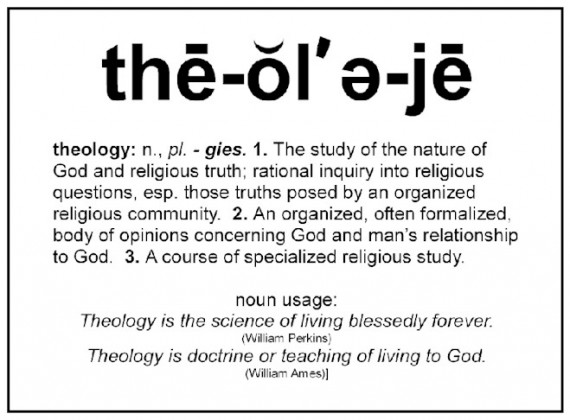 It is often taught that Jesus obeyed the law perfectly because we cannot. Then we are told that when we believe in Jesus for eternal life, He give us His righteousness. He has such an infinite supply of righteousness, that He can pour some of it into us so that we also become righteous.
It is often taught that Jesus obeyed the law perfectly because we cannot. Then we are told that when we believe in Jesus for eternal life, He give us His righteousness. He has such an infinite supply of righteousness, that He can pour some of it into us so that we also become righteous.
We are told time and time again that by faith, the perfect righteousness of Jesus can be credited to our account.
I am certain that if you searched this blog, you would find that I have written something similar along these lines in numerous places in the past.
But I have recently begun to question the whole idea. There is just something about this “crediting to our account” that doesn’t sit well with me…
So please forgive me if I do a little theological rambling in this post. I am throwing this out there because I am wondering about it, and would like your input. I am not sharing what I believe… I am sharing what I think. Feel free to share your opinion in the comments below!
The Ocean of Good Works from the Past
I recently taught Luke 3:7-14 again. In that passage, John the Baptist tells his Jewish audience to not say, “We have Abraham as our Father” (Luke 3:8). I taught that this was because of how the Jewish people understood themselves as the elect nation of God, as the chosen people of Israel. The idea was that God needed the people of Israel to accomplish His will in the world, and so God would never destroy the Hebrew people, because then He would be stuck.
I went on to argue that some branches of Judaism took this idea to an extreme, saying that some of the forefathers of Israel were such good people, that they had more “good works” than they needed, and so their good works could be credited to the account of later Hebrew people who came up short in personal righteousness. In other words, men like Abraham, Isaac, Jacob, Moses, and the prophets had created this ocean of good works, or this storehouse of righteousness. And when any Jewish person sinned a little too much, God would cancel out that sin with a little bit of good works from the ocean of righteousness that came from the Israelite forefathers.
Some Christians today may scoff at this idea, but others might say, “Hey, that sounds eerily similar to what we believe and teach in our church!” In fact, one teaching among some Catholics have taught that certain Saints of the past have stored up such great masses of good works, that if we pray to them, or perform some sort of penance, then the Catholic church can “draw on” the good works of the saints of the past and credit them to certain people today.
This idea was one of the things that led Martin Luther to write his 95 Theses and nail them to the church door in Wittenburg. Certain Catholics were selling indulgences, whereby a person could donate a certain amount of money to the Catholic church, and in exchange, the church would credit some good works to that person to cover over their sin. This, of course, led to great abuse, and so Martin Luther wrote up his 95 Theses… and the rest is history.
Protestants continue to scoff at the idea that giving certain amount of money, or saying certain prayers can credit to our account the righteous good works of any person in the past…. except that…. this is pretty close to exactly what we believe about Jesus.
The Good Works of Jesus Credited to Our Account?
While I don’t know if it is ever stated exactly this way, it sometimes seems that we teach that Jesus kept the law perfectly so that as the only perfect person, He could credit His righteousness to our account.
Doesn’t this sound similar to what was discussed above? That there is this ocean of good works that is available for withdrawals by people who have the proper access codes?
If this view is correct, then it seems that the only real difference between the various theologies is in the source of the ocean of good works. In some theological ideas, the ocean of good works comes from great men and women of the past, either the Israelite forefathers or the Christian saints, whereas in common “Evangelical” theology, the source of good works is Jesus Himself.
If this is the way it is, I don’t really have too much of a problem with it. Everything is centered on Jesus Christ, and all we have comes through Him.
But I just got to wondering….
What if the real issue isn’t good works at all?
What if the primary goal of Jesus was not to store up for us an ocean of good works for us to draw upon, to fill up what is lacking in our holiness, but rather, to show us once and for all that it is not about good works at all?
What if the point of Jesus’ life, ministry, death, and resurrection was not to give us the “correct” ocean of good works to draw upon, but rather, to show us that God isn’t concerned about our amount of good works?
Let me approach the question another way.
All around the world and throughout time, humankind has thought that God (or the gods) is angry with us. We think we need to appease him (or them) by doing good works. So, for example, a child dies from sickness, and we think, “God is punishing me for something. I probably didn’t thank him enough for the good harvest last year. I need to make God happy again. What can I do? Maybe if I give him my cow, he won’t take my other children or burn my house down.”
This is the basis of ALL religion. Religion is an attempt by humanity to make things right with God. We think God is angry at us for some sort of failure, and if we do something good or heroic or sacrificial, God will be happy with us again. We are not always sure what ticked him off, but the priests and clerics are happy to make suggestions, and the priests and clerics are also happy to make suggestions on what will get us back into God’s good graces (Usually this requires giving things to the priests, which they call “Giving to God.” But I digress…)
You see, one of the central teachings of all religions is this idea that we need a certain level of good works to keep God happy, and if we don’t maintain this level of good works, we either have to start doing better, or obtain the good works from someone else (who does good works for us). If we fail, well, God will squash us like a bug. (Unless we are really wicked and evil, then we seem to get rich, famous, and powerful. But again, I digress…)
If Jesus came to teach that we do actually need good works to get God to love us, then Jesus is actually supporting the central idea of human religion. But over and over and over, Jesus seems to teach the exact opposite. Time and time again, Jesus attacks religion as being contrary to God and actually leading people away from God, into deeper bondage and darkness.
When Jesus came along, it seems that His central message was this: “You have completely misunderstood God! He loves you just as you are! He loves sinners. He forgives sinners. He is gracious and merciful toward sinners. You don’t need more good works or better good works to get on God’s good side; you are already on God’s good side! And I’m here to prove it to you!”
Could it be that our primary problem is not a lack of good works, but simply a failure to truly understand God’s infinite love?
I think so.
The reason God doesn’t want us to sin any more is NOT because sin gets in the way of His love for us. It is not as if God is saying, “Darn! I really wanted to love you, but you just had that lustful thought, so now I am going to have to give you cancer. And if you keep it up, well, off to eternal suffering in hell with you! But I really wish you had been a better person so I could love you.”
I am sorry, but that view of God seems a bit…. sadistic. Doesn’t it?
I thin it was Anselm who said that God is so holy and takes sin so seriously, that if He told someone to turn right, and they turned left, God would be fully justified to send that disobedient person to hell for all eternity because they turned the wrong way.
Seriously?
Doesn’t this make God more like an egotistical, petulant bully who wants to get his own way no matter what, and when someone crosses him in the least little way, he is going to smack them down so hard they never think of doing it again?
It is no wonder that many people have trouble worshiping a God like this!
Thankfully, one of the reasons Jesus came was to show us that this is NOT what God is like! If Jesus is right, God is not a God of religion.
So…. I Don’t Need Good Works?
Ah…. now we are starting to ask the right questions. I firmly believe that if your theology does not lead you to ask this question, you have really bad theology. If you do not have a theology which causes people to say, “So…. I can just go sin all I want?” then your theology is not strong enough on grace, forgiveness, love, and mercy.
So here’s the thing about good works, grace, and God’s love.
Technically, yes, you can go sin all you want, and God will still love you. Sin and good works have nothing whatsoever to do with God’s love for us. He loves us infinitely and completely, no matter what. We don’t need more good works or better good works for God to love us.
But God does want us to stop sinning. It is true that God hates sin. But He doesn’t hate people. He doesn’t even hate sinners. He loves all people–even sinners.
The reason God (and Jesus) are concerned about sin, is not because sin will lessen God’s love for us. No, God is concerned about sin because He loves us! Sin, you see, has nothing to do with God’s love. Good works have nothing to do with getting back into God’s good graces.
No, the reason God hates sin is because of how much sin damages and harms His children. Sin hurts us! That is why He doesn’t want us to sin! That is why He warns us against sin and pleads with us to turn away from it.
Like any good parent, God love us so much that He does not want to see us get hurt, and nothing hurts us more than sin. Sin brings forth death. It leads to damaged relationships, broken lives, and ruined friendships. It leads to bankruptcy, addiction, and imprisonment. It can lead to bloodshed, horror, war, famine, pestilence, and disease. God loves us so much, He wants to deliver us from all these things, and one way He does this is by pleading with us to turn away from the path we are on, and walk with Him in a life of love, joy, and peace.
And the life of Jesus resembled what a life lived this way looks like. Jesus didn’t do what He did so that He could store up a big ocean of good works to make available to all people who believe in Him. No, Jesus did what He did to show us what God is truly like, and what humanity can also be truly like.
We don’t need more good works to make God love us, and if we have less good works, God will not love us less. The life and ministry of Jesus had nothing to do with His good works or our lack of them.
No, Jesus wanted to show us that God loves us completely, and that the reason God doesn’t want us to sin (especially not to sin religiously, which is how most Christians actually sin… but again, I digress), is because sin hurts us and as a loving Father, God does not want to see us get hurt.
So what do you think? Did Jesus create a big ocean of good works which believers can draw on? Or, as I have suggested above, maybe the life of Jesus had nothing whatsoever to do with good works at all. Weigh in below!




 So, for example, the word “saved” might refer to being delivered from one’s enemies, or getting healed from a sickness, or being rescued from drowning at sea. Obviously, these words are not related to gaining or keeping eternal life. I would guess that the majority of times the words saved, save, salvation, etc., are used in Scripture, they are used in this way (e.g., Matt 8:25; Acts 27:31).
So, for example, the word “saved” might refer to being delivered from one’s enemies, or getting healed from a sickness, or being rescued from drowning at sea. Obviously, these words are not related to gaining or keeping eternal life. I would guess that the majority of times the words saved, save, salvation, etc., are used in Scripture, they are used in this way (e.g., Matt 8:25; Acts 27:31). Once you see the difference in Scripture between the word “saved” and the terms “eternal life” or “everlasting life” or even something like “justification” you begin to see that while there are numerous verses which talk about saving something that can be lost, there is not a single verse in the Bible which talks about losing eternal life, losing everlasting life, or losing our justification. All of these gifts of God, once given, are never revoked or taken back.
Once you see the difference in Scripture between the word “saved” and the terms “eternal life” or “everlasting life” or even something like “justification” you begin to see that while there are numerous verses which talk about saving something that can be lost, there is not a single verse in the Bible which talks about losing eternal life, losing everlasting life, or losing our justification. All of these gifts of God, once given, are never revoked or taken back.









